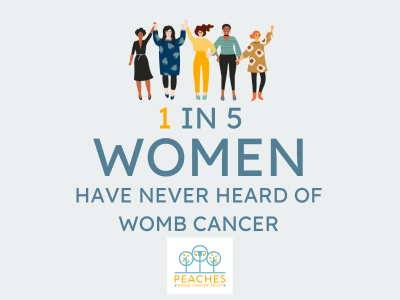Womb cancer, also known as endometrial and uterine cancer, affects approximately 9,700 people annually, that’s 27 people every day in the UK. Despite this, our recent survey conducted during June, Womb Cancer Awareness Month, reveals that one in five women have never heard of, or were unsure if they had heard of, womb cancer.
Most diagnosed are over 50 years of age and have gone through the menopause, but womb cancer does affect younger women too.
Seven people die of womb cancer every day in the UK. When diagnosed at an early stage, womb cancer is often treatable. When diagnosed at early stages, 1 and 2, the survival rate is 92%. When the disease is diagnosed at later stages, 3 and 4, the survival rate reduces to 15%. Currently 1 in 5 women, or people with a womb, are diagnosed at advanced stages.
Peaches want to change that and save lives.
Helena O’Flynn, Chair of Peaches Womb Cancer Trust
“We’re asking women, and those with a womb, to get to know the signs and symptoms and talk about womb cancer with their friends. Let’s make sure that those one in five hear about womb cancer. Anyone who notices unusual vaginal bleeding should get it checked out by their GP.”
The main symptom of womb cancer is unusual vaginal bleeding.
If you are post-menopause (haven’t had a period of a year more), this is any vaginal bleeding, including spotting or discharge which can be pink, red, brown or watery.
If you are pre-menopause you may notice your periods are heavier than normal, bleeding between your periods and/or after sex, an abnormal vaginal discharge, persistent tummy pain, blood in your urine, unexplained weight loss.
There are other conditions that are not cancer which may cause these symptoms but if you notice any of these symptoms it is important to get checked out by your GP.
What is womb cancer? Find out more, including the signs and symptoms, here.
Notes:
The ‘one in five women’ figure is from YouGov Plc. Total sample size was 2021 adults. Fieldwork was undertaken between 3rd – 4th June 2024. The survey was carried out online. The figures have been weighted and are representative of all GB adults (aged 18+).
All other figures are taken from most recent Cancer Research UK data.


